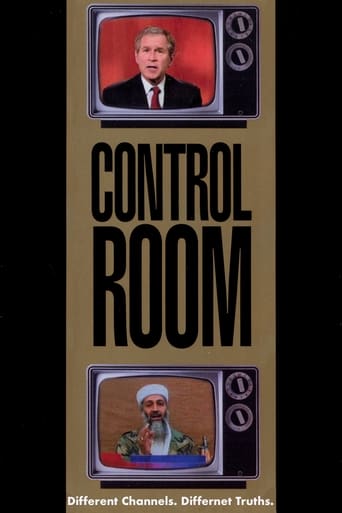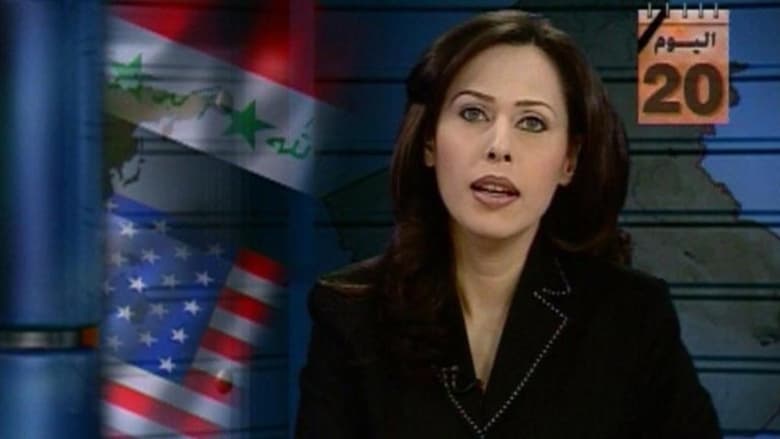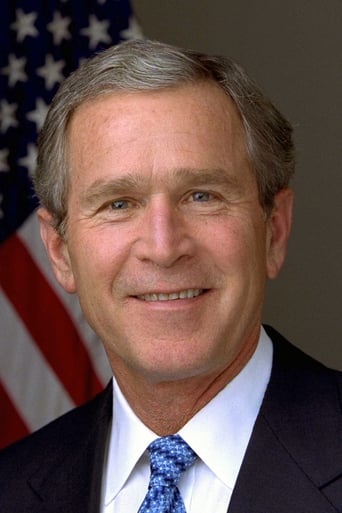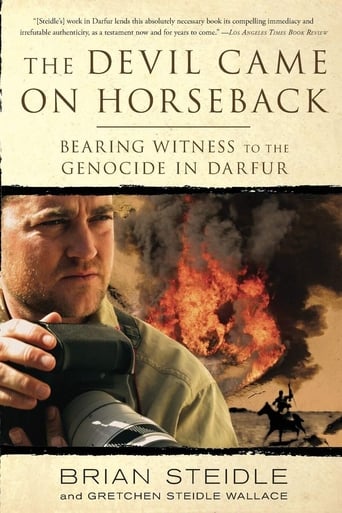Control Room (2004)
A chronicle which provides a rare window into the international perception of the Iraq War, courtesy of Al Jazeera, the Arab world's most popular news outlet. Roundly criticized by Cabinet members and Pentagon officials for reporting with a pro-Iraqi bias, and strongly condemned for frequently airing civilian causalities as well as footage of American POWs, the station has revealed (and continues to show the world) everything about the Iraq War that the Bush administration did not want it to see.
Watch Trailer
Cast
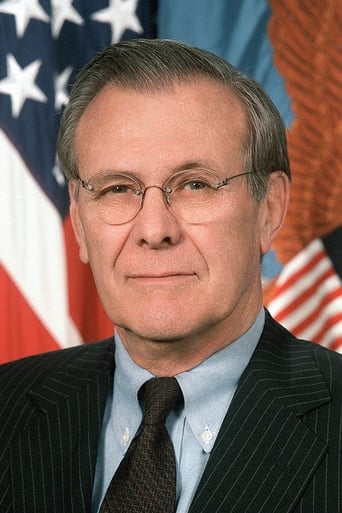
Similar titles
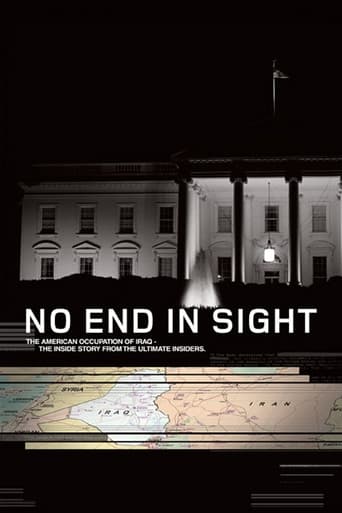

Reviews
When a movie has you begging for it to end not even half way through it's pure crap. We've all seen this movie and this characters millions of times, nothing new in it. Don't waste your time.
A film with more than the usual spoiler issues. Talking about it in any detail feels akin to handing you a gift-wrapped present and saying, "I hope you like it -- It's a thriller about a diabolical secret experiment."
One of the worst ways to make a cult movie is to set out to make a cult movie.
The thing I enjoyed most about the film is the fact that it doesn't shy away from being a super-sized-cliche;
Dear IMDb:I found no other way to do this, so I'm using the "review" feature to do it: I couldn't remember the name of this film for many minutes (almost an hour) and I used your "keywords" and so on... but I couldn't draw up "Contol Room" that way.. Even when I typed in "iraq," or "Iraq War," I didn't get Control Room as one of the films on your data base. Now, I know that "key word" is not the same as, say, "Subject Heading" in a Library... but, it still bothers me, that key word means (evidently) nothing more than "one of the words of the title.." So, for example, if I was interested in Austrailia's history in the first World War, I could type in all those words into the key words option, but my search wouldn't come up with "Gallipoli," because that isn't a key word?In short: is there no way to have a "subject search" as part of your searching options? (And if not, why not?)Yours,Jerry Dyer
Recently in my English class, we read "Living-Room Wars," by David D. Perlmutter that discussed how most people gain information on rather large topics like contemporary wars from sitting on their couches in their living rooms, watching the television set. In his essay, Perlmutter describes the term "living-room war" not as "physical proximity - battle that can be smelled and felt a few inches away but the para-proximity enabled by modern communications technology, especially the satellite" (Perlmutter 525). They see bloody drastic images of men fighting other men with brief captions like "live" and 'up close and personal" so they think they are experiencing war for themselves. He also acknowledges the great influence newscasters have because they act like subjective filters that restrict the public's view of war and narrow or even sometimes make the interpretations the public have. What the public sees on the news channels is what they are told is important and think is important because that is what is being shown. He describes this as a "circular, self-limiting system and a conflation of communal enlightenment and ignorance" (Perlmutter 529). A recent documentary, "Control Room," thoroughly studies the differences between the Arab news network Al Jazeera and the American news networks stationed in Iraq at the same time. The movie shares the different viewpoints of United States and Iraq. Iraq think United States is there to gain control while United States is there to hopefully maintain control. Although, I can not blame Al Jezeera for feeling invaded by the American news networks. The movie shows that all the major American news shows have rooms stationed there in hopes of filming the most recent and important news stories. Perlmutter discusses a problem of how reporters will inundate a foreign land where American troops have been sent to fight or intervene. "The sheer number of journalists committed to one story means that any other news is largely impossible to cover no cameras are available for disaster elsewhere in the world once the global press corps has been committed to one site" (Perlmutter 539). The movie goes on to explain how biased both the news networks really are. For example, Al Jazeera has commercials showing United States invading their land followed by pictures of a stranded baby and then dead bodies. The news network from United States may show images of Iraqi men under the control of Saddam Hussein killing and invading the homes of their own people. The movie stresses the influence of images and pictures both media show. Similarly, in "Living-Room Wars," Perlmutter devotes part of his essay to explain the power of images. He provides three different powers of images of war or any other subject. The first is that images can have aesthetic power and the second is that pictures can serve as an icon. The third power of picture which is also described in the movie is their political power because images are the driving force of policy and publics. The pictures of dead bodies shown on the news for either side evoke emotion, sometimes sadness, but more often than desired, anger and the need for revenge. One person says in the movie that "pictures are so desperate." The movie mentions that Al Jezeera shows more bloody images than the American news. Al Jezeera is even shown to use media and images to lie to the country. After the Americans bombed a certain place in Iraq, Al Jezeera instructed women and children to go to that area so that they could be filmed there in the ruins. Since so many people would be watching this particular news network, Bush labeled Al Jezeera the mouthpiece of Saddam Hussein. One good point the movie brings up about Al Jezeera is that they invite Americans to speak on their news show and voice their point of views. At least they are trying to get the other side, whether or not they believe it or not. The newscasters try to interview people who have both sides of the story. Even though, Al Jezeera still does not show everything to its public. The American soldiers stationed there can tell what they are showing and what they are excluding from the news. The exact same can go for the American news. One person during the movie mentions that what the Iraqi public do not know is what Al Jezeera is not reporting or showing. Perlmutter brings up this point when he says that "what is not visualized is not news." The media is so influential that it can ignore an issue or an event and "thus withhold it from the collective consciousness and attention of the world" (Perlmutter 538). "Control Room" does a thorough job of discussing both the good and bad points of Al Jezeera as well as the American news. It films both sides and both point of views. It shows the substantial significance of television news in informing the public of what is happening to their country and others, even if the news will be biased. It brings up a question of whether or not there are any journalists who are objective to the war and telling news. It clearly proves that sadly, there are none.
Control Room is an excellent, unbiased documentary about how differently the media portrays the Iraq War depending on which sides they come from. Control Room excellently displays how both the American and the Arab news networks are very different and at the same time, very much alike. Control Room shows the largest and most popular news network in the Arab World, the Al Jazeera Network, in a way not very many Americans have seen before. During the Iraq War, Al Jazeera has been hard at work trying to bring "news" to the rest of the Arab World. Control Room is presented to Americans who have no access to Al Jazeera. The purpose: to inform people the American media censors and filters images to satisfy the patriotic public. Al Jazeera presents news that is contrary to American news. Al Jazeera may present live images of dead American soldiers; Americans may never see as much a coffin. They are two different societies and two very different views on the Iraq War. During the "liberation" of Baghdad American news networks showed a band of liberated Iraqis tearing down Saddam's statue and waving an old Iraqi flag. Al Jazeera claims that his is all staged for the American media to satisfy the American public. Although Al Jazeera and the American news network are contrary to each other, they exist for the sole purpose of satisfying their viewers. Al Jazeera may present dead bodies of American soldiers, but they are only doing it to please their anti-American viewers. Similarly, the American news networks may not show dead American soldiers to please their viewers. Again, during the "liberation" of Baghdad, Americans see Iraqis destroying images of the old regime while Al Jazeera claims that these images were artificial. The media are doing this to please their viewers by showing them what they want to see. The way the author of the documentary chose to present the movie was very unique and ironic. Not a single word was spoken in form of a narrative, but it was a mosaic of interviews and images. It is ironic because Control Room is about the many different perspectives one can have about images, yet the author decided to use images as a narrative. I thought this was a very good use of images because it shows viewers the power of images. Images are so powerful they tell their own story without the need of a traditional narrative. The theme of Control Room ties with David D. Perlmutter's, "Living-Room Wars". Perlmutter's essay is also about the power of images and their effects even on war itself. It can start, stop, or win wars. If Americans were to see the many dead bodies of American soldiers, they would be encouraging their government to stop the war. Using images such as the "liberation" of Baghdad, America can win the support of their people. On the other hand if the Arab World could see the good America is doing, they would not be so anti-American. Overall Control Room is a very informative and entertaining movie. It really does present both sides of the media war well.
Control Room is a remarkable documentary which examines the Arab news network al Jazeera and its depiction of the U.S. war with Iraq. It further illustrates the biases that permeate the media, which projects a skewed representation of the world to the public. Control Room is one of the first genuine attempts to show the Iraq War from an objective point of view. While U.S. media often justifies the presence of American troops in Iraq, glorifying U.S. soldiers as liberators, it becomes apparent that the Arabs perceive the United States as invaders. This film helps to shed some light on the blunders of the Bush Administration, exposing the truth about many aspects of this war that are continually filtered from American television.The central focus of this film is to raise awareness of newscasters' blatant fabrication of information for the purpose of inducing specific reactions out of television viewers. This is well illustrated in a segment of the video where an al Jazeera employee describes how one British newscaster, in an attempt to glorify American war efforts, recorded a group of children who were chanting in Arabic about President Bush. Even though this reporter did not understand Arabic, he reported that the children were cheering for Bush, when in fact they were cursing at him. This example supports an argument made by David Perlmutter in his essay "Living Room Wars," where he analyzes the role that media plays regarding war coverage. In a portion of his essay entitled Realism, Perlmutter discusses the damaging effects of news videos. He says that the juxtaposition of images and captions often does not convey the whole truth yet, " .very few people challenge the notion that television can express falsehood" (541). The media's censorship blinds the public from the truth about the war. Most people don't think to contend the accuracy of the information that is presented to them and as a result, willingly absorb the media's propaganda.One of the most eye-opening clips in this movie is a statement made by an Iraqi who said that American media is a leverage to induce fear in the American public. Fear is perpetuated by making Americans feel like they are under siege by the Iraq government. From an American standpoint, fear for the safety and well-being of the country justifies the Bush Administration's decision to declare war with Iraq. It is clear, however, that the vast majority of these fears are media induced and are therefore unwarranted. Several times throughout the video, Iraqis name the United States as the single greatest military threat in the world. Iraq, who admits military inferiority to the United States, has much more to fear from us than we have of them. By exposing the intent of U.S. media to instill fear into American citizens, it becomes apparent just how manipulative and hypocritical the Bush Administration truly is. There has been repeated criticism of al Jazeera for the uncensored footage of dead Iraqi civilians, stirring up anti-American sentiments and deliberately staging media to promote Arab nationalism. America accuses al Jazeera of being untruthful when U.S. media uses the exact same tactic of aiming negative sentiments at the Iraqi government to heroify the efforts of American military troops. The glorification of Americans is no new concept. James Loewen, author of "Handicapped by History" argues that the heroification of American icons, like U.S. soldiers and President Bush, stir positive sentiments in Americans and this in turn ensures a continual approval of the United States. It is distressing that we need media enhanced icons to increase our acceptance for our country. Control Room does a compelling job of illustrating the biases of war coverage. As Americans, we are sheltered from the perspectives of other countries. It is amazing how much information is butchered by the media. By the time we see the war coverage on television, it has been manipulated so much that the stories contain only a fraction of their original truthful information. By refraining from any verbal narration, the director and producer of this documentary has helped to preserve the neutrality of the film. It is interesting to see how this war is perceived on both ends of the spectrum instead of one biased account.
